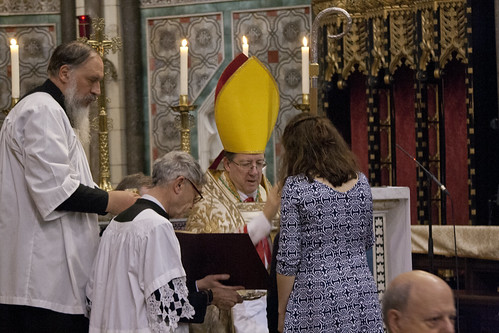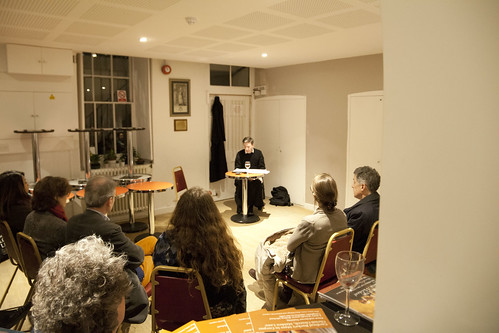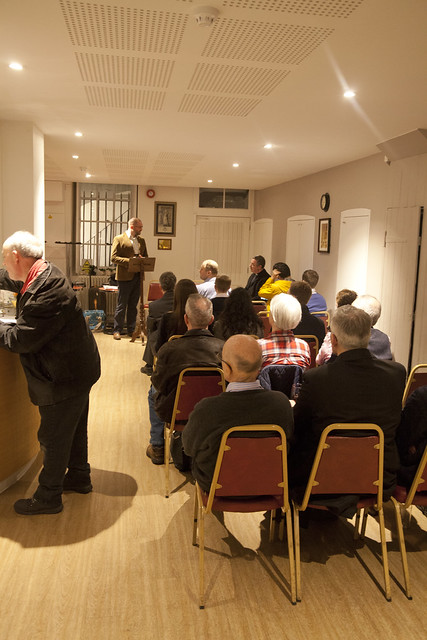Chairman's Blog
Confirmations: Being Stricter than the Law
Since 2004, with a break in 2020 for COVID, the Archdiocese of Westminster has supplied an auxiliary bishop to confer the Sacrament of Confirmation according to the 1962 liturgical books. In the 16 services which have taken place over 17 years, 593 candidates have been confirmed using this rite. These services were open to Catholics from all over England and Wales, and indeed beyond: occasionally we had candidates from Scotland and France. As time has gone on several other bishops have plucked up the courage to hold confirmation services in their own dioceses. One such was due to take place in just a couple of weeks, 6th February, in the Oratory at Birmingham.
These have now all been cancelled. It seems the bishops of England and Wales had a meeting, online, and decided that they must not be allowed, under the terms of the Responsa ad dubia, which the Congregation for Divine Worship published before Christmas. The Responsa ruled out the use of the older Pontifical, the liturgical book which contains the Rite of Confirmation, and also the Roman Ritual. Neither of these books was mentioned in Pope Francis’ Apostolic Letter, Traditionis Custodes. It is not clear how or why a Roman Congregation, supposedly interpreting Pope Francis’ document, is adding entirely new regulations not found in the original. They are, we might say, being stricter than the law.
Bishops in England and Wales, and around the world, have in any case the authority to abrogate from the universal law of the Church for the good of souls, under Canon 87.1. They referred to this Canon in addressing the problem thrown up by Traditionis Custodes, which appeared to say that parish churches should not be used for the traditional Mass, when the overwhelming majority of such masses are being celebrated in parish churches, with no practical alternatives available. This Canon has not been changed. If bishops, who can see the harm done to the good of souls by a strict implementation of the Responsa which itself does not have the force of law, want to implement it anyway, they themselves are being stricter than the law.
Traditional Confirmations cancelled in England and Wales
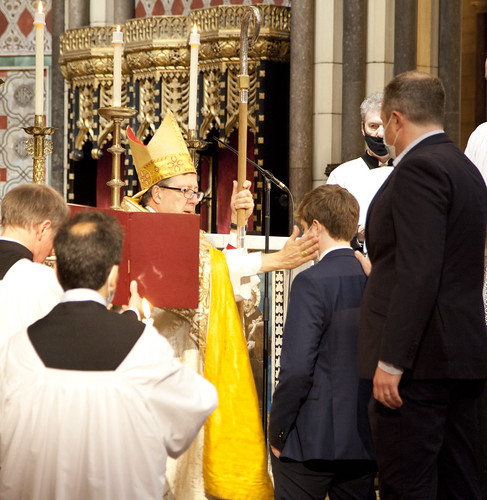 |
| Bishop Sherrington, an auxiliary bishop of Westminster Diocese, administers the confirmation 'slap'. He wears a cope and mitre, and holds a crozier, symbols of his office. |
Latin Mass Society Statement on Confirmations: January 2022
The Latin Mass Society regrets to report that Cardinal Vincent Nichols has made the decision (communicated to the Society by letter) that the Sacrament of Confirmation is not to be celebrated according to the 1962 liturgical books in the Archdiocese of Westminster. The annual celebration which has for nearly twenty years been organised by the Latin Mass Society at St James’ Spanish Place, at which candidates were confirmed by an auxiliary bishop of the Archdiocese—and on one occasion, by Cardinal Raymond Burke—will accordingly not take place this year, or until this decision is reversed.
We understand that another planned celebration of this Sacrament, by Archbishop Bernard Longley of Birmingham, has also been cancelled.
Comment from Joseph Shaw, LMS Chairman.
The Archdiocese of Westminster has provided an auxiliary bishop to confer Old Rite Confirmation annually since 2004. In recent years bishops in several other English dioceses have also organised traditional Confirmations in other parts of the country. These celebrations have been joyful occasions, attended by many children and young adults, their families, sponsors, and friends. They have been clear expressions of the importance the Society’s supporters attach to their link with their bishops, and our bishops’ pastoral concern for us. They have enormously strengthened the sense of unity in the Church: both our sense of belonging, and, I believe, the bishops’ own sense that we are indeed sheep of their flock.
The cessation of these celebrations implies the loss of much that the Bishops of England and Wales have sought, and achieved, in establishing a serene co-existence between the new and old liturgical forms. Confirmation is above all a sacrament for young people and converts. It will cut off many from accessing it in a form ‘particularly suited to them’ (as Pope Benedict expressed it).[1] Others will be driven to seek it outside the structures of the Church.
We hope that the Bishops of England and Wales come to reconsider their decision, and allow once more the ancient Roman liturgy in all its manifestations to be part of the legitimate diversity of liturgical forms we have in this country.
Ends.
————————————————————
Comment
Reading of the difficulties and conflicts between groups of the faithful attached to the Traditional Mass and their bishops, in some parts of the world, we have long been able to say, in England and Wales: this is not the situation here. With regard to Confirmation, and in many other ways, our bishops have shown themselves willing to see us cared for using those liturgical forms which are, as Pope Benedict called them, ‘treasures’, which attract us because of their ‘sacrality’, and in which we are ‘formed’ (Letter to Bishops, 2007).
This is no longer the case. While this situation continues, it is implied that the liturgy of the Saints, Doctors, Martyrs, and holy Popes of twelve centuries and more is suspect, and that we ourselves are not worthy of the pastoral consideration given to all sorts of groups in this country: Polish Catholics, Syro-Malabar Catholics, Ukrainian Rite Catholics, and many others, who receive pastoral care distinct from the standard English-language Novus Ordo liturgy.
I hope the Bishops of England and Wales appreciate the deeply problematic nature of this situation, particularly in light of the steps which Pope Francis has taken to legitimise the ministry of the Society of St Pius X, whose members will not feel themselves bound to observe any restrictions on the use of the Traditional Sacraments.
In light of the Canon law guidance which we have published, which confirms that the recent Responsa ad Dubia issued by the Congregation for Divine Worship, which appear to prohibit the use of the 1962 Pontificale, does not have the force of law, we call on His Eminence, Cardinal Nichols, and the Bishops of England and Wales, to reconsider their position, before real pastoral harm is done, and damage to the fabric of unity which will not easily be repaired.
Server Training in London: February, April, May
 |
| Server training in St Mary Moorfields |
Cross-posted from the Society of St Tarcisius blog.
We have booked dates for the first half of the year as follows:
26th February, St Mary Moorfields, from 10:30 am to 4pm. Booking page.
2nd April, St Dominic's Haverstock Hill, from 11 am to 4pm (please come to the parish hall on the left of the church). Booking page. Note the new venue!
21st May, St Mary Moorfield, from 10:30 am to 4pm. Booking page.
St Mary Moorfield's is 4/5 Eldon Street, London EC2M 2LS: more on the venue.
St Dominic's Priory is at Southampton Rd, NW5 4LB: more on the venue.
div>
Are Traditional Catholics 'corrupt'? A response to Austen Ivereigh
 |
| Mass of Reparation, celebrated in response to clerical abuse revelations in 2018. |
Austen Ivereigh writes that he has been troubled by a criticism of the restrictions on the Traditional Mass brought in last July by Pope Francis' Traditionis Custodes. This is the point, made even by people with no particular interest in the ancient Mass, that it was an example of collective punishment: the innocent were being deprived of the Mass alongside those, whoever they are, who are truly guilty, of whatever it is they are supposed to be guilty of. Even if we accept Pope Francis' characterisation of Bad Trads, it can't be true of everyone who has derived solace from the old Mass. It can't, in fact, even be true of most, because it implies a degree of theological engagement which is unusual. Most Catholics don't spend their time talking about Vatican II's teaching on Religious Liberty, for example, because most Catholics, whether they have encountered the old Mass or not, don't have a very clear idea of what it is -- the idea is absurd.
Furthermore, we have been told over and over again that Pope Francis is all about 'dialogue', 'meeting people where they are', not expecting people to be perfect, seeing the Church as a 'field hospital', not 'throwing stones' and all the rest of it. His treatment of Catholics attached to the Old Mass seems, to put it mildly, in tension with this
Ivereigh quotes Greg Hillis: “At a time when we as a church are embarking on a synodal path,” Hillis wrote, “I have difficulty understanding why a more synodal—a more dialogical—approach is not being taken with traditionalists.”
This 'nagged' at Ivereigh, he tells us. But he has come up with a solution. He has dug up something written by the Pope back in 1991, which distinguished 'sin' from 'corruption':
Hence, writes Bergoglio, “we could say that while sin is forgiven, corruption cannot be forgiven,” for at the root of corruption is a refusal of God’s forgiveness. The corrupted person or organization sees no need of repentance, and their sense of self-sufficiency gradually comes to be regarded as natural and normal.
This is the use of words not with the usual meanings, but let's go with that. The first problem is that it is no clearer than before that all, or a majority, or even an important minority of Catholics who attend Mass regularly or occasionally in the Old Rite should be categorised in this way. It is still an unjust collective punishment. Ivereigh deals with this, however, by saying that the rest of us are guilty by association because we have not attacked the guilty ones.
Conversely, the sinner—even when not ready to repent—knows that he is a sinner and yearns to throw himself on God’s mercy. This is the key distinction: the sinner remains, however obscurely and unconsciously, open to grace, while the corrupt deny that they sin. Enclosed by their pride, they shut out the possibility of grace.
“We are ready to convert if party spirit or pride has polluted our hearts.” Why if and may? Isn’t “party spirit and pride” one thing traditionalism has become famous for?
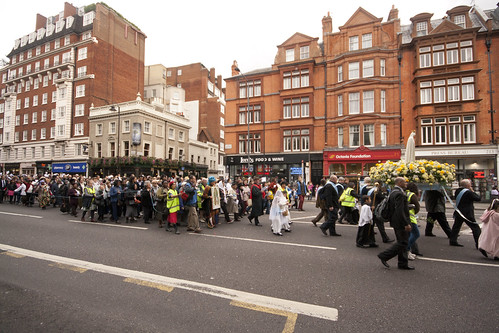 |
| Rosary Crusade of Reparation in London. |
Support the Latin Mass Society
Iota Unum 2022 Season
 |
| Prof Tom Pink |
Please come to the Golden Square entrance directly to the basement: 24 Golden Square, W1F 9JR, near Piccadilly Tube Station (click for a map)
Thomas Pink is a Professor in Philosophy at King's College London and a Patron of the Latin Mass Society. He has a particular interest in the history of theology in the early modern and modern periods, on religious liberty and the role of the Papacy.
Friday April 29th, David Hunt ‘The perennial sin of Usury’
 |
| David Hunt |
David Hunt studied at the International Theological Institute in Austria to study philosophy and theology, and recently completed an MA in Philosophy at the University of Buckingham with a thesis titled ‘Usury Redux: A defence of the scholastic position on usury’. David lives in Kent with his wife and five children.
Friday May 27th, Dr Jeremy Pilch ‘St John Henry Newman and Our Lady Mediatrix of All Graces’
 |
| Jeremy Pilch |
 |
| Tim Stanley |
Dr Stanley is a well-known historian and journalist, and author of the recent Whatever Happened to Tradition?
Support the Latin Mass Society
The attack on Latin: Tito Casini
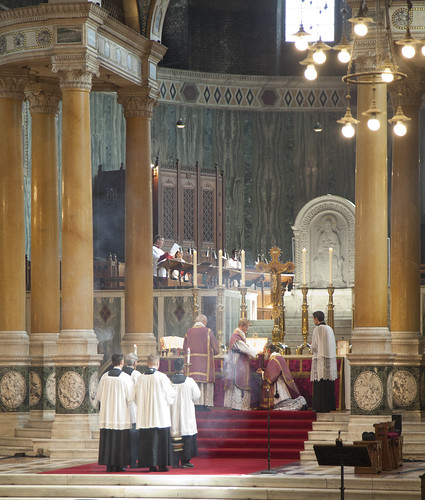 |
| The celebrant blesses the deacon before the latter proclaims the Gospel at High Mass. LMS Annual Mass for our Annual General Meeting in Westminster Cathedral, 2021 |
I have been reading the Traditionalist classic, Tito Cassini’s The Torn Tunic, first published (in Italian, La Tunica Stracciata) in 1967, reprinted by Angelico Press. It is an impassioned, indeed ferocious, statement of the case for liturgical traditionalism, written and published before the Novus Ordo Missae was promulgated. Casini, like most Catholics of the time, has only the vaguest idea what further changes were being cooked up. What he was objecting to was the things which had already been done, notably by the 1964 Instruction Inter Oecumenici, and the liturgical abuses which had been springing up. Casini’s focus, like that of the Latin Mass Societies and Una Voce groups which were founded as early as 1964, was the use of the Latin language.
Iota Unum talks: Prof Tom Pink on Papal Monarchy, Friday 28th Jan
We are delighted to announce a new series of Iota Unum talks. The following have been confirmed. Great speakers, great topics, plenty of wine, an intimate setting and lots of time for discussion: if you in reach of London, don't miss out!
January Friday 28th: Thomas Pink: ‘Papal Monarchy’
February Friday 25th: Theo Howard: ‘The Dominicans and the English Parliament’
March Friday 25th: Pierpaolo Finaldi ‘On the vocation of the Catholic author’
April Friday 29th: David Hunt‘The perennial sin of Usury’
May Friday 27th: Dr Jeremy Pilch ‘St John Henry Newman and Our Lady Mediatrix of All Graces’
June Fri 17th: Dr Timothy Stanley ‘Whatever Happened to Tradition?”
Doors open 6:30pm; talk at 7pm
Basement of Our Lady of the Assumption & St Gregory, Warwick Street: enter via
24 Golden Square, London W1F 9JR (click for a map)
The Direction of Worship, for Catholic Answers
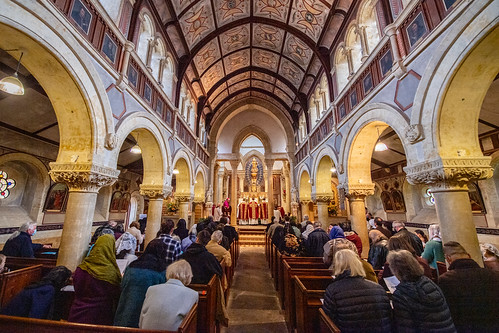 |
| LMS Pilgrimage to Chideock. Photo by John Aron. |
The subject of which direction the priest should stand while celebrating Mass has generated a great deal of attention since about the middle of the twentieth century. The celebration of Mass “facing the people” (versus populum) was officially encouraged after Vatican II, but the historic practice, of “facing East” (ad orientem), is still permitted in the reformed Mass and normative for the traditional Latin Mass.
Even before the Second Vatican Council, some important historic churches, notably St. Peter’s in Rome, had altars at which celebration facing the people was possible. In St. Peter’s (and also in the Basilica of the Holy Cross in Jerusalem), this was because the high altar was over an important holy place, which needed to be accessible from the nave of the church, via steps. The solution to the design problem was to allow the priest to celebrate facing east, toward the rising sun, from the apse side of the altar. This general arrangement was imitated (or anticipated) in some other ancient churches.
The idealised past and anti-Tradition: the Brown Windsor Myth
 |
| King Alfred the Great lets the cakes burn. |
A key feature of tradition is the notion of a past as in some sense normative: the past as a guide to action in present, because that past should in some sense be restored. Tim Stanley talks about this in his Whatever Happened to Tradition?
Online Latin Courses: discounts for Clergy & Seminarians
The new year will see a new set of online Latin Courses from Matthew Spencer. The Latin Mass Society is happy to sponsor clergy (priests and deacons) and seminarians (or those preparing for the diaconate) to tune of 80% of the course fees.
More from Matthew Spencer.
Do you wish you had better Latin — to follow the liturgy, or immerse yourself in the theology and history of the Church?Since 2020, small groups have been meeting over Zoom to help individuals do just, with the support of an accomplished ancient linguist.
Now, after "Traditionis Custodes", the Latin of the Roman Canon has become a particular renewed focus for many people. Therefore a special 3-month route, led by Matthew Spencer (MA MSt Oxon) to better linguistic understanding of this ancient text, which unites the vetus and novus ordo, concluded just before Christmas.
A repeat of the course (further details here) will begin in the last week of February 2022 for a limited number of people.
'The Latin Mass Society,' as Matthew writes, 'is generously supporting my initiative by offering 80% bursaries to any Catholic priest, monk, nun, religious sister or permanent deacon or seminarian (or other Catholic religious) who has established ties to England or Wales.'
The standard course fee is £600 — reduced to £120 for LMS Bursary holders — and allows you to meet with no more than four others, together with the instructor, for two 1-hour sessions weekly over 12 weeks. (A short break of a few days will ideally occur every four weeks, schedules permitting.)
We meet on the days most convenient for the group. As a special New Year offer, those who do not qualify for the bursary may take the three 4-week individual modules at a reduced price of £500 for all 3 modules — if they sign up or express an initial interest by 2022. [deadline??]
Alternatively one module may be taken for £200, based on prior experience of Latin (please write directly to matthewjaspencer@yahoo.com to discuss your options).
An independently moderated examination (conducted "viva voce") is now available for those who need or would like conformation of their level of Latin for pastoral or liturgical purposes.
About the three-month course a Dominican sister writes: '. I have found that by the way you blend actual reading from texts, group exercises and grammar lessons, I have been able to slowly assimilate everything as we have progressed. This has worked well for me.'

